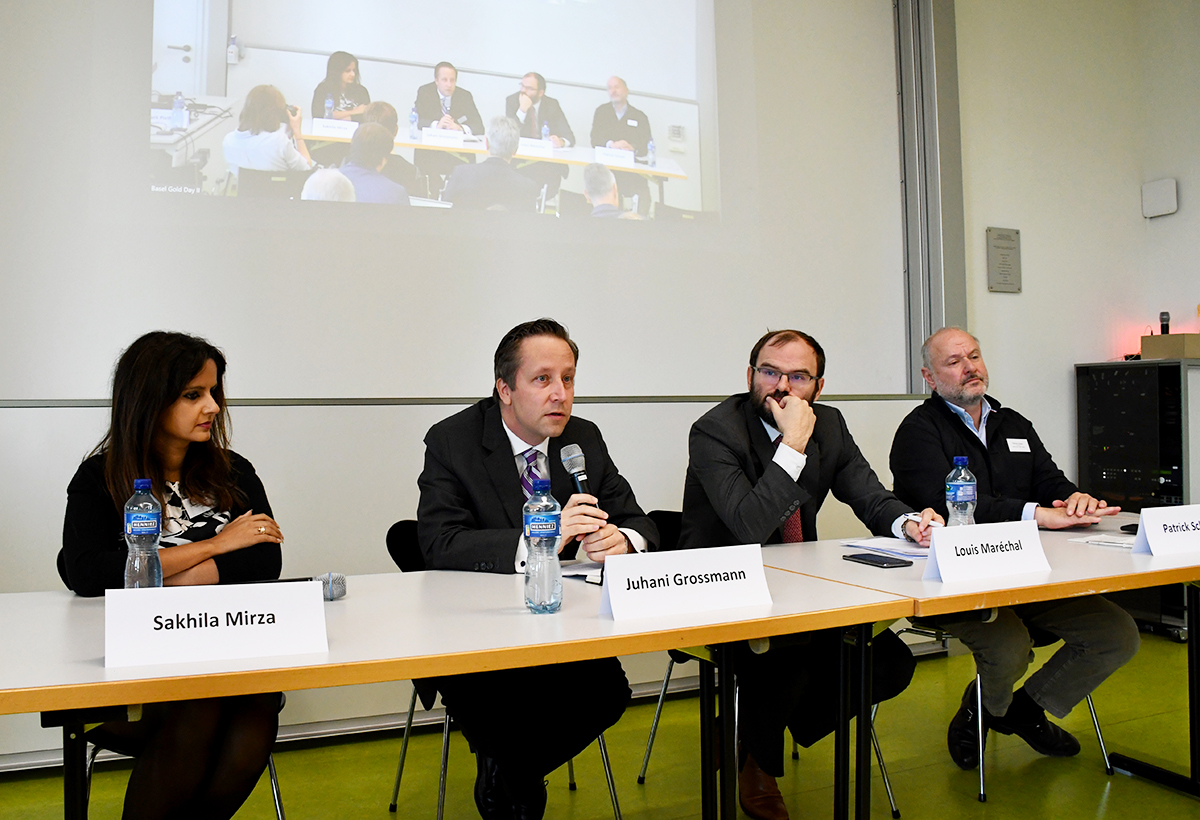Corruption in gold mining and recycling

A summary of Juhani Grossmann’s remarks at Basel Gold Day II on corruption risks in gold supply chains. He highlights experiences from our Green Corruption team, explains why recycled gold might not be as ethical as it sounds, and ends with two broad recommendations for companies, state-owned enterprises and regulators in the gold trade.
Gold is a fascinating commodity for those of us seeking to address corruption linked to environmental crimes. Its value chain is high in corruption risks, not least due to its high financial value to size ratio, complex sourcing structure and high emotive value. The origin of a particular piece of gold is easy to obscure through refining. And as Mark Pieth’s book Gold Laundering points out, the consequences of corruption in the gold trade are severe for people and for the environment.
Despite the plethora of standards around gold, and the detailed and advanced due diligence guidance, their implementation is patchy and effectively excludes significant parts of the globe. The OECD has tackled this issue with various practical resources including some excellent FAQs related to corruption risks in the mining sector. The Financial Action Task Force (FATF) report on gold also highlights numerous money laundering and corruption challenges.
Corruption: a multi-use tool to undermine the gold trade
Our global Green Corruption teams see many of those concerns playing out in real life, including:
- In Indonesia, Parliamentary Speaker Setya Novanto was caught on tape trying to extort a private jet from the operator of the Grasberg gold mine as part of the government’s takeover of the mine. The Governor of Southeast Sulawesi, Nur Salam, operated a complex web of corruption-fuelled mining licenses that was constantly adjusted in favour of the highest bidder. Both officials were subsequently convicted of corruption offences.
- In Peru, we see the highly publicised risks in Madre de Dios, to take just one example, and sophisticated efforts to smuggle gold from informal artisanal and small-scale mines (ASM) into legitimate supply chains.
- In Bolivia, gold is crucial to the economy, making up 6.2 percent of GDP. Yet there is also clearly an urgent need to strengthen the resilience of regulators against untoward influence and corruption in order to protect the integrity of national parks.
In numerous countries, corruption is used to avoid effective environmental impact assessments, to issue fake export permits and certifications and to ward off inspections. When wrongdoing is uncovered, corruption helps to stymie law enforcement efforts.
This severely undermines conservation goals and the rights of local communities. It also further complicates assurance inside the gold value chain.
Recycled gold is no less risky
As these challenges are well documented in the mined gold sector, and assurances are particular challenging in the ASM field, there is an increasing search for alternative sources of gold to meet the high demand.
Some consider recycled gold (or “recyclable gold” in the OECD’s terminology) to be a safer source since it comes from gold that was already in circulation, primarily in the jewellery industry. Recycled gold now reportedly makes up 25-30 percent of annual gold use. Some companies even market their use of recycled gold as the more ethical choice over freshly mined gold.
Opting for what is considered a lower-risk product has three challenges, however:
- First, it is not clear what “recycled” gold encompasses. Definitions vary and many participants at Basel Gold Day II agreed they were too broad and vague.
- Second, the risk factors for recycled gold are not nearly as well studied and understood as those of mined gold.
- Third, the belief that the risk factors are lower might mean less due diligence.
Are corruption risks for recyclable gold different? If so, how? While there is little detailed research on this, here are some initial considerations:
- The corruption risks inherent in the original feedstock have not disappeared. While the legal liability for these might be limited, it doesn’t mean the gold is obtained without corruption.
- Companies trading recycled gold, according to the Financial Action Task Force (FATF), tend to be itinerant due to their low start-up costs and thus perform only minimal due diligence.
- High demand for recycled gold makes it tempting to launder problematic mined gold, for example gold from conflict zones, into the recyclable value chain.
- When recycled gold is traded across borders, if faces the same corruption risks related to licenses and permits as mined gold.
- The high-cash, low-scrutiny nature of recyclable gold buyers puts them at major risk for money laundering.
Proper checks, strong internal controls
While more research is needed to study the corruption risks related to recycled gold, these are certainly not negligible. What can be done about them?
First, companies using recycled gold should apply the full due diligence suggested by the OECD, covering the whole value chain where needed according to a risk-based approach.
Second, regulators and state-owned enterprises involved in the gold trade need to get serious about managing their internal corruption risks. This requires strengthening the independence and capacity of internal control, investigation and audit bodies to uncover wrongdoing. It also requires continuous internal corruption risk assessments, the development of mitigation measures, and agile verification of their effectiveness.
More
- The Basel Institute’s Green Corruption programme provides assistance and capacity building to environmental agencies with enforcement powers, as well as to law enforcement partners targeting environmental crime. The team also works to prevent corruption seeping into regulatory or conservation authorities and state-owned enterprises engaged in activities of high environmental importance.
- Learn more about Basel Gold Day in 2020 and 2022.




